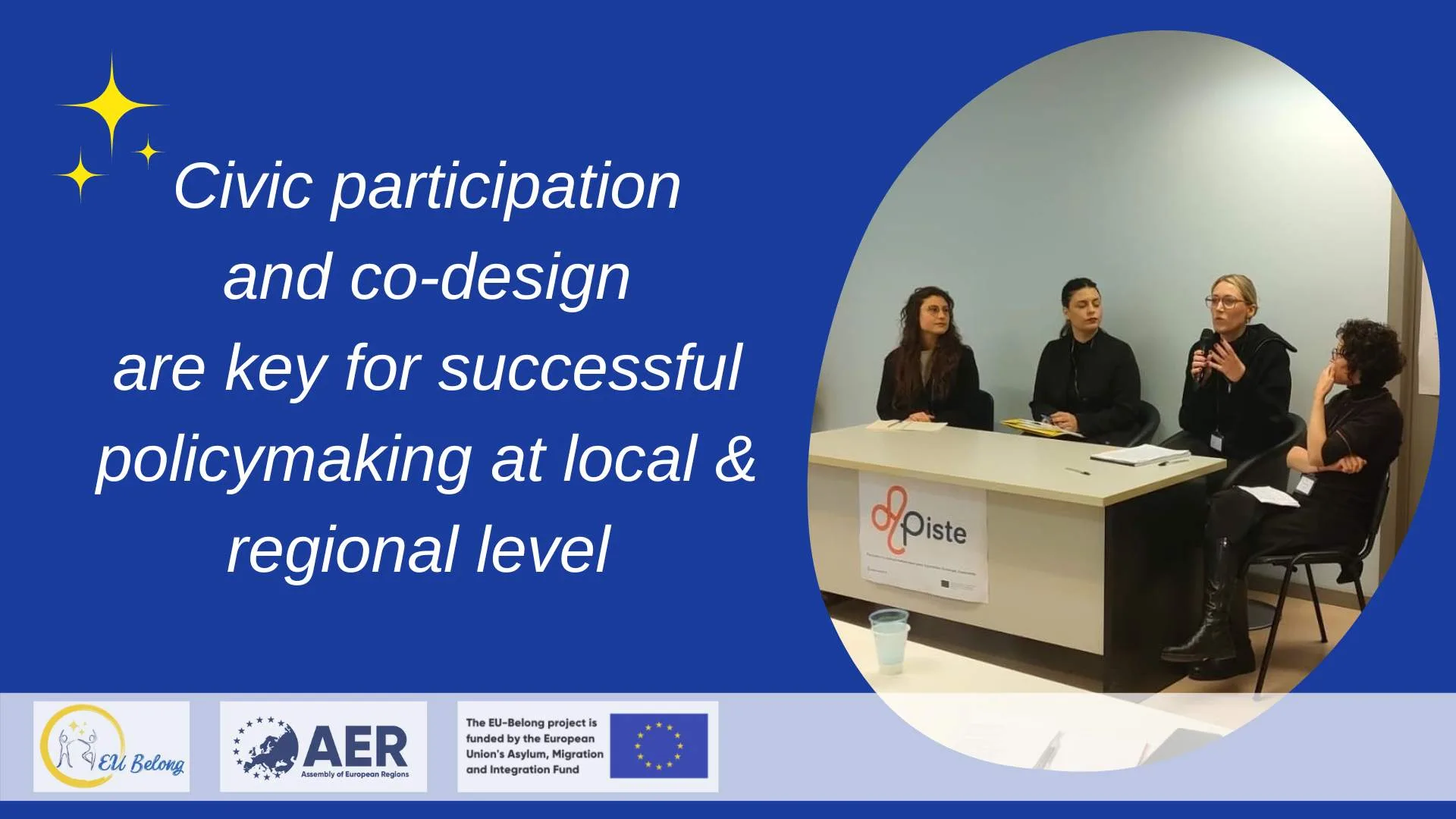 Share this!
Share this!On January 25th, EU-Belong Project Manager Emanuela Pisano spoke at the final event of the PISTE project, to share how EU-Belong is using the intercultural approach developed by the Council of Europe to innovate regional policymaking. By working with small and medium towns on the one side and regions on the other, the two initiatives promote migrant participation in policy processes. Together, EU-Belong and PISTE demonstrate how inclusive participation contributes to the construction of a safe and healthy European society.
Experimenting Migrant Participation in Small and Medium-Sized Towns
The PISTE project, funded by the European Commission’s AMIF programme, set out to work on the quality of civic participation and integration policies. The project partners from Belgium, Greece, Germany and Italy focused their action, experimentations, and research on promoting the participation of migrants in the design of policies, their implementation, and evaluation. The project also facilitated peer assessment in Small and Medium-sized Towns (SMTs).
The shared vision and complementary approaches of the EU-Belong and PISTE projects provided a fertile ground for knowledge exchange on the occasion of the conference Experimenting migrants’ participation in small and medium-sized towns.
Participation and co-design at the heart of the projects’ approaches.
The complementary approaches of the EU-Belong and PISTE projects provided a fertile ground for knowledge exchange on the occasion of the conference Experimenting migrants’ participation in small and medium-sized towns.
Of particular interest for practitioners and researchers interested in the development of participatory processes in the development of integration strategies, is the White Paper published by the PISTE project. The publication indeed provides insights into the experimentations at the local level and highlights key findings:
- Bridging figures play a crucial role in creating links between migrant communities and the broader local population.
- Visible spaces within small and medium-sized towns facilitate the integration and participation of individuals with migration backgrounds.
- Local capacity building is essential for empowering migrant communities to engage actively in civic and political processes.
- Preconditions such as access to resources and supportive environments significantly influence the level of participation among migrants in SMSTs.
EU-Belong is based on the intercultural approach which considers integration as a dynamic and mutual process between all stakeholders. It is based on four pillars: valuing diversity, implementing real equality (which involves fighting discrimination), fostering civic participation and encouraging meaningful interaction.
How to implement an intercultural approach in policymaking?
EU-Belong developed a series of resources to get started in the development of an intercultural integration strategy such as:
- Building Intercultural Competences: A Handbook for Regions and Stakeholders: This handbook serves as a toolkit for public authorities and personnel working in local services and intercultural specialists. It provides examples and recommendations for capacity-building activities.
- A structure and Methodology to implement Multi-Stakeholder Learning Labs: Ahead of the co-design process, this guide helps regions organise meaningful events with stakeholders to listen to their needs, raise awareness on interculturalism and engage them in the co-design of policies
- Intercultural Integration Self-Assessment Questionnaire: evaluates migrant integration in areas such as labor market mobility, education, and anti-discrimination. It was created by the Region of Catalonia to help regions evaluate their intercultural integration capabilities.
- Peer-Review of European Replicable Good Practices: The AER reviewed successful intercultural integration strategies at the regional level, selecting 10 good practices. The practices promote equality, non-discrimination, and meaningful interaction and serve as an inspiration for policymakers.
- Multi-stakeholder model framework and Toolkit for Regional Intercultural Integration Strategies: This framework for intercultural integration strategies at the regional level helps practitioners and policymakers in migration, diversity, and inclusion to develop adaptable integration strategies. The toolkit provides step-by-step guidance on how to get started and how to progress with the co-design of an intercultural strategy together with regional stakeholders.
Join us in learning how to use an intercultural approach!
The AER and Catalonia are facilitating peer learning and cooperation on using an intercultural approach in sectoral policies through the EU-Belong Transfer Clusters. To learn more about implementing interculturalism across policy areas through multistakeholder collaboration and co-design, or to stay informed about EU-Belong’s activities, such as webinars and the development of pilots, register to the EU-Belong Newsletter (scroll down to the bottom of the homepage).
EU-Belong is a 3-year project run by the Assembly of European Regions (AER) and 12 partners, and co-funded by the AMIF Programme of the European Union.
This article was written by Nicola Miceli, who did an internship on Policy & Knowledge Transfer at the AER Secretariat from January 2024 to June 2024.
